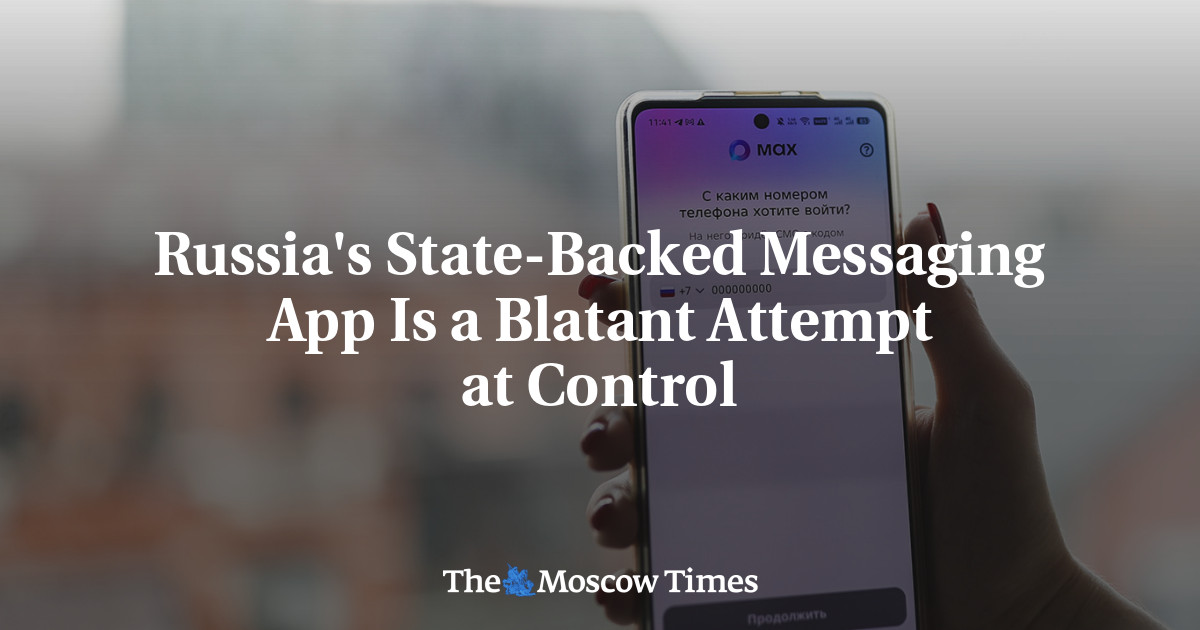
Russia’s State-Backed Messaging App Is a Blatant Attempt at Control
How did your country report this? Share your view in the comments.
Diverging Reports Breakdown
Russia’s State-Backed Messaging App Is a Blatant Attempt at Control
Russian authorities are trying to block Telegram and WhatsApp, two of the country’s most popular messaging apps. The goal is to replace them with the Russian-made messenger Max, says Alexander Nekrassov. He says the goal is total information control, cutting the public off from uncensored news. Nekrasov: Max is clearly open to state security, just as WeChat is to Chinese state security.. The same charges could be applied to social media posts via social media, he says, spreading “discrediting” messages or “fakes” via the group social media accounts of “foreign agents’”. He adds: “This is not a messenger — it’s a damn center for total data collection! It is easy to imagine the enthusiasm with which Russian security officers will prowl Max’S group chats’ group chats and private private chats.�“It may not be long until we see a final block on Telegram and. WhatsApp, plus mandatory linking of the new Russian messenger to everything from the. state services portal to bank and online store verification codes. This is already being discussed.”
Administrative pressure plays a big role. In Putin’s Russia, public-sector workers — long treated like serfs — have no choice over what apps they use. Government agencies, universities, and schools have been ordered to move their work chats to Max. The same demands go out to property management companies, which are told to move building-wide chats into the state’s surveillance messenger. It may not be long until we see a final block on Telegram and WhatsApp, plus mandatory linking of the new Russian messenger to everything from the state services portal to bank and online store verification codes. This is already being discussed. If you want to know what that will look like, just look at China’s national messenger WeChat, in place since 2011. More than 90% of the population uses it. It is fully integrated with all possible services and entirely under state control. Privacy level? Zero. There is no end-to-end encryption; the company that “owns” it, Tencent, can read any messages, personal or group. The system automatically scans for keywords to delete opposition content. Stories of memes (like comparing autocrat Xi Jinping to Winnie the Pooh) or messages suddenly disappearing from chats are routine in China. Accounts with frequent negative content or criticism of the Chinese Communist Party (which has its own cell inside Tencent) can be monitored and lead to punishment, including criminal charges. For example, in 2017, Shandong resident Wang Jiangfeng received a one-year and ten-month prison sentence for calling Xi Jinping a “steamed bun” in a group chat. A Chinese court ruled it was defamation and “disrupting public order.” In 2019, journalist Ding Lingjie and two human rights activists were sentenced to 20 months in prison for a video parodying Xi Jinping. The Russian Max messenger is clearly just as open to the FSB as WeChat is to Chinese state security. Programmers on GitHub published the results of their study of Max, which concluded: “This is not just a messenger — it’s a damn center for total data collection!” It is easy to imagine the enthusiasm with which Russian security officers will prowl Max’s group chats and private messages to cook up showcase criminal cases. Right now, people are already jailed for “discrediting” the army or spreading “fakes” via social media posts. But soon, the same charges could be applied to group messages in the “sovereign” messenger. Professional informers will be the only losers — their job will no longer be needed when users’ own devices report them. Send a picture of Navalny or a link to an FBK investigation to a “closed” group of 20 people, and you could be shipped off to serve time. One can only hope that most Russians, saddled with this digital snitch by the state’s “voluntary-compulsory” order, will have the sense not to incriminate themselves this way. And to ensure that the multiethnic Russian people harbor no doubts about the benevolent intentions behind Makh, State Duma deputy Sergei Boyarsky decided that the pro-government bloggers and bots singing the app’s praises weren’t enough, and proposed checking its most vocal critics for “foreign influence.”
